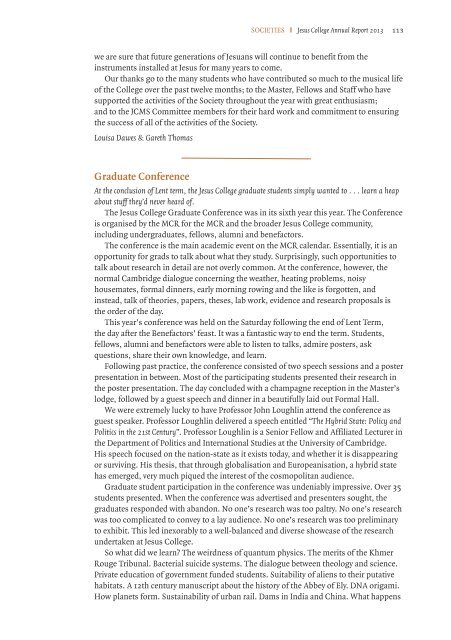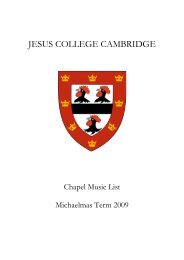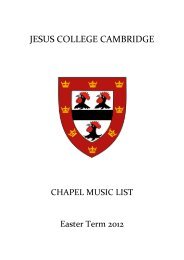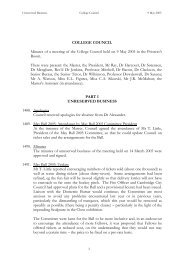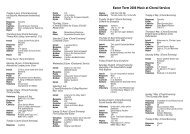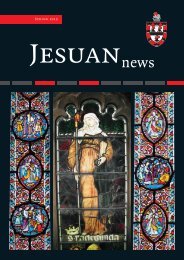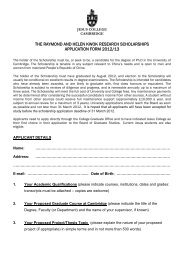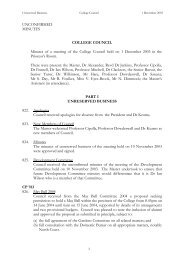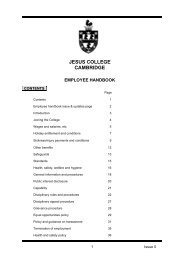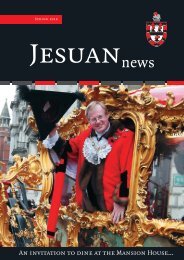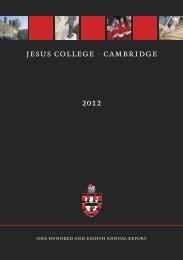2013 Annual Report - Jesus College - University of Cambridge
2013 Annual Report - Jesus College - University of Cambridge
2013 Annual Report - Jesus College - University of Cambridge
You also want an ePaper? Increase the reach of your titles
YUMPU automatically turns print PDFs into web optimized ePapers that Google loves.
SOCIETIES I <strong>Jesus</strong> <strong>College</strong> <strong>Annual</strong> <strong>Report</strong> <strong>2013</strong> 113<br />
we are sure that future generations <strong>of</strong> Jesuans will continue to benefit from the<br />
instruments installed at <strong>Jesus</strong> for many years to come.<br />
Our thanks go to the many students who have contributed so much to the musical life<br />
<strong>of</strong> the <strong>College</strong> over the past twelve months; to the Master, Fellows and Staff who have<br />
supported the activities <strong>of</strong> the Society throughout the year with great enthusiasm;<br />
and to the JCMS Committee members for their hard work and commitment to ensuring<br />
the success <strong>of</strong> all <strong>of</strong> the activities <strong>of</strong> the Society.<br />
Louisa Dawes & Gareth Thomas<br />
Graduate Conference<br />
At the conclusion <strong>of</strong> Lent term, the <strong>Jesus</strong> <strong>College</strong> graduate students simply wanted to . . . learn a heap<br />
about stuff they’d never heard <strong>of</strong>.<br />
The <strong>Jesus</strong> <strong>College</strong> Graduate Conference was in its sixth year this year. The Conference<br />
is organised by the MCR for the MCR and the broader <strong>Jesus</strong> <strong>College</strong> community,<br />
including undergraduates, fellows, alumni and benefactors.<br />
The conference is the main academic event on the MCR calendar. Essentially, it is an<br />
opportunity for grads to talk about what they study. Surprisingly, such opportunities to<br />
talk about research in detail are not overly common. At the conference, however, the<br />
normal <strong>Cambridge</strong> dialogue concerning the weather, heating problems, noisy<br />
housemates, formal dinners, early morning rowing and the like is forgotten, and<br />
instead, talk <strong>of</strong> theories, papers, theses, lab work, evidence and research proposals is<br />
the order <strong>of</strong> the day.<br />
This year’s conference was held on the Saturday following the end <strong>of</strong> Lent Term,<br />
the day after the Benefactors’ feast. It was a fantastic way to end the term. Students,<br />
fellows, alumni and benefactors were able to listen to talks, admire posters, ask<br />
questions, share their own knowledge, and learn.<br />
Following past practice, the conference consisted <strong>of</strong> two speech sessions and a poster<br />
presentation in between. Most <strong>of</strong> the participating students presented their research in<br />
the poster presentation. The day concluded with a champagne reception in the Master’s<br />
lodge, followed by a guest speech and dinner in a beautifully laid out Formal Hall.<br />
We were extremely lucky to have Pr<strong>of</strong>essor John Loughlin attend the conference as<br />
guest speaker. Pr<strong>of</strong>essor Loughlin delivered a speech entitled “The Hybrid State: Policy and<br />
Politics in the 21st Century”. Pr<strong>of</strong>essor Loughlin is a Senior Fellow and Affiliated Lecturer in<br />
the Department <strong>of</strong> Politics and International Studies at the <strong>University</strong> <strong>of</strong> <strong>Cambridge</strong>.<br />
His speech focused on the nation-state as it exists today, and whether it is disappearing<br />
or surviving. His thesis, that through globalisation and Europeanisation, a hybrid state<br />
has emerged, very much piqued the interest <strong>of</strong> the cosmopolitan audience.<br />
Graduate student participation in the conference was undeniably impressive. Over 35<br />
students presented. When the conference was advertised and presenters sought, the<br />
graduates responded with abandon. No one’s research was too paltry. No one’s research<br />
was too complicated to convey to a lay audience. No one’s research was too preliminary<br />
to exhibit. This led inexorably to a well-balanced and diverse showcase <strong>of</strong> the research<br />
undertaken at <strong>Jesus</strong> <strong>College</strong>.<br />
So what did we learn? The weirdness <strong>of</strong> quantum physics. The merits <strong>of</strong> the Khmer<br />
Rouge Tribunal. Bacterial suicide systems. The dialogue between theology and science.<br />
Private education <strong>of</strong> government funded students. Suitability <strong>of</strong> aliens to their putative<br />
habitats. A 12th century manuscript about the history <strong>of</strong> the Abbey <strong>of</strong> Ely. DNA origami.<br />
How planets form. Sustainability <strong>of</strong> urban rail. Dams in India and China. What happens


